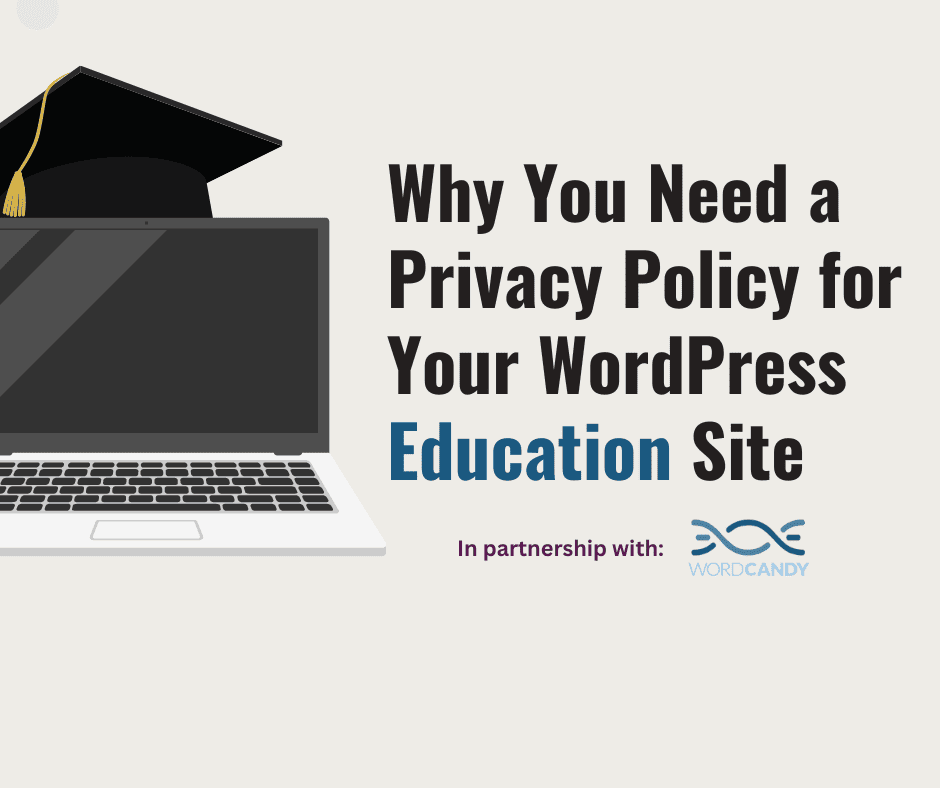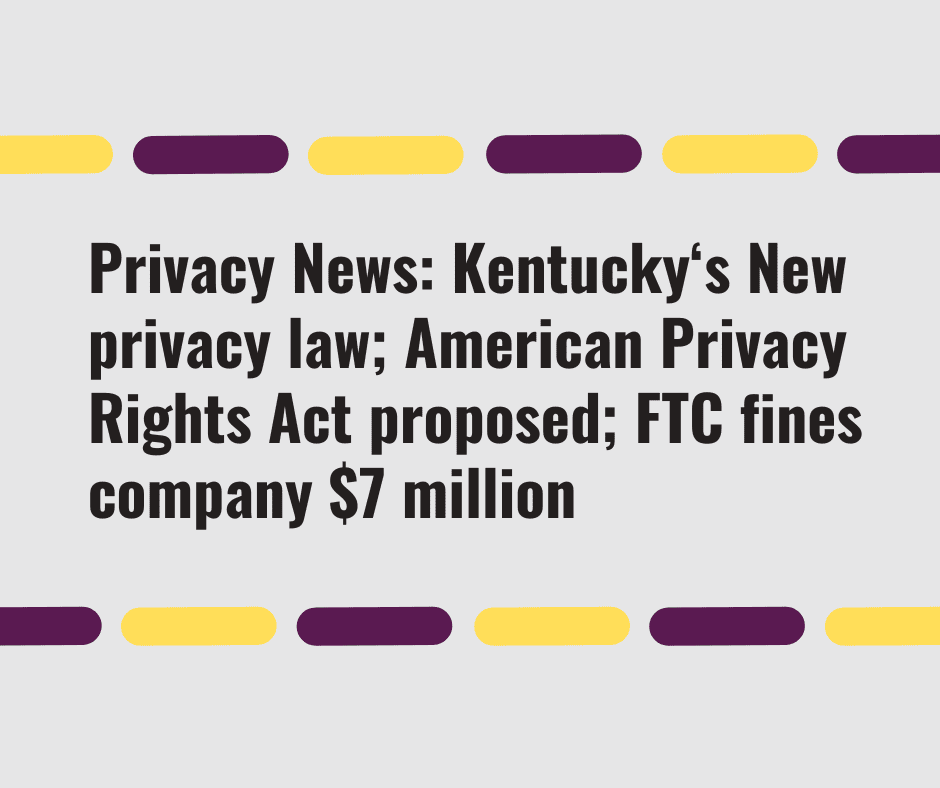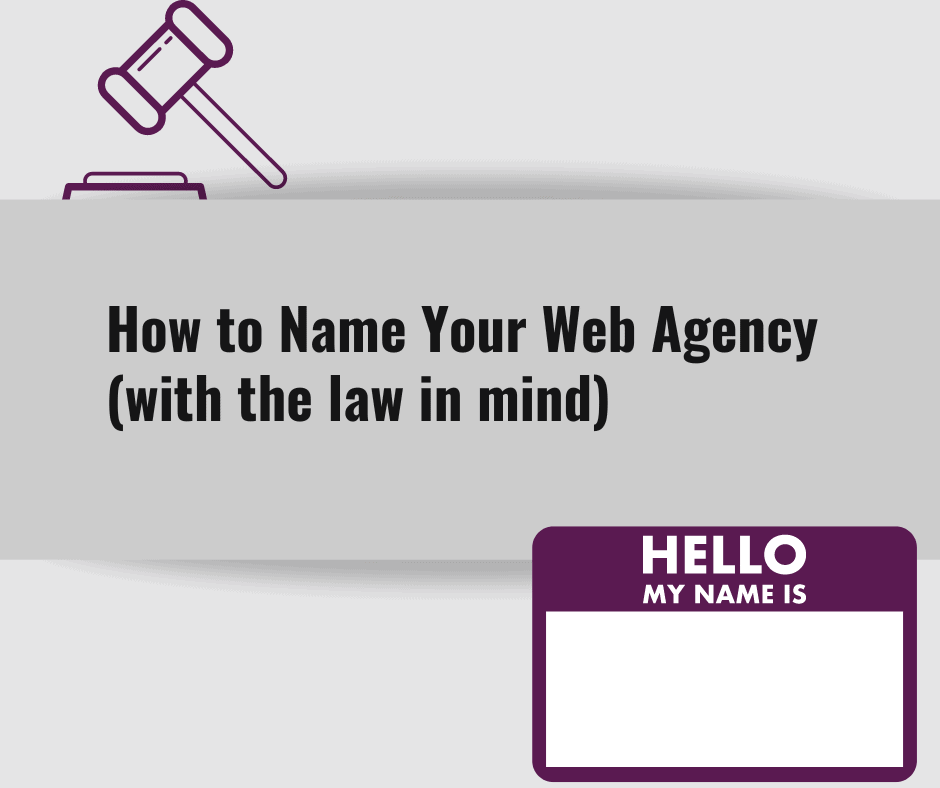If you’ve decided to use WordPress for your online education business, you’ve made a smart choice. This platform is powerful, accessible, and very flexible. However, you might be wondering how to make your education site compliant with privacy laws.
This is where Privacy Policies come in. These documents can help protect your education business from fines and lawsuits. What’s more, creating a Privacy Policy is easy with the right tools and know-how.
In this post, we’ll look at the basics of Privacy Policies and why your education site needs one. Then, we’ll discuss five tips for creating an effective policy. Let’s dive right in!
Table of Contents
What Is a Privacy Policy?
A Privacy Policy is a document that explicitly outlines what data a website collects from its visitors or customers. It also specifies how that data is collected, managed, and used.
In recent years, Privacy Policies have become increasingly important, mainly due to the rise of invisible tracking technologies and online privacy laws. Some laws, such as the Virginia Data Consumer Protection Act (VCDPA), require businesses to include instructions on how people can opt out of any targeted promotions they don’t want to receive.
You’ve probably come across a Privacy Policy before:
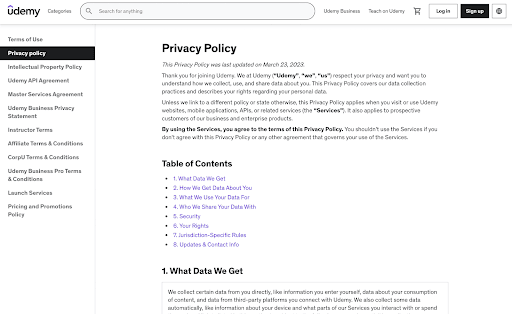
Since the contents of a Privacy Policy are largely dependent on the privacy laws that apply to you, your industry, location, and users, they tend to vary greatly.
For instance, if you’re using WordPress for education, you’ll need a Privacy Policy that covers all the data you collect in relation to your courses. In the next section, we’ll take a closer look at Privacy Policies for education sites.
Why Every Education Site Needs a Privacy Policy
Now, let’s talk about why Privacy Policies are essential for education websites. When we say “education site”, we are referring to platforms that offer online courses, such as Skillshare and Udemy, not traditional educational institutions:
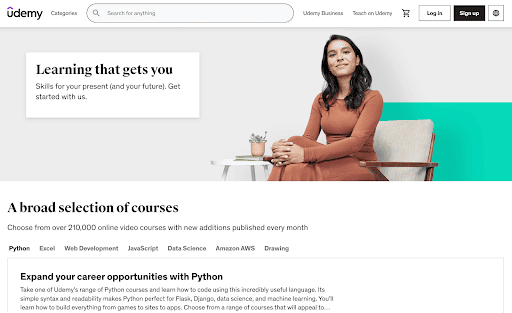
It’s important to point this out because this type of site essentially functions as an online store, offering on-demand courses that users can sign up for right away. On the other hand, a brick-and-mortar school will likely have a traditional tuition payment system.
In any case, WordPress education sites will still deal with student data. As you can imagine, this will differ slightly from the traditional e-Commerce scenario.
For instance, it’s likely that an e-Commerce store will need a customer’s name, payment information, and address. Education sites will need a lot of the same information, but they’ll likely require some additional details for their student profiles.
Regardless, if you’re collecting personal information for your online classes, you’ll need to comply with different privacy laws. These include (but are not limited to):
- EU General Data Protection Regulation (GDPR)
- Personal Information Protection and Electronic Documents Act (PIPEDA)
- California Online Privacy Protection Act (CalOPPA)
- California Privacy Rights Act (CPRA)
- Utah Consumer Privacy Act
- Quebec Law 25
For more information, check out this comprehensive list of privacy laws for websites.
As you can see, privacy laws are typically dependent on where you do business and where you offer your goods or services. This means that, if your WordPress education website reaches a global audience, you may have to consider the privacy laws of every country you cater to.
Privacy laws are also dependent on your website visitors. They can be dictated by whose personal information you are collecting and who you are tracking online.
If you do not comply with all of the privacy laws that are applicable to your business, you could get hit with heavy fines. Sadly, this could be disastrous for your reputation as a professional education site. Therefore, you’ll need to create a comprehensive Privacy Policy.
5 Tips for Creating an Effective Privacy Policy
Now that you’re more familiar with Privacy Policies and why they’re important, we’re going to share a few tips to help you create one for your education site.
1. Use a Privacy Policy Generator
As we mentioned earlier, the type of Privacy Policy you need will depend on a variety of factors. This includes the location of your business and customers, and your industry.
Unless you’re a legal professional, writing a Privacy Policy can be pretty complicated. Plus, if it’s not up to par, you have a lot to lose.
Therefore, our number one tip is to use a Privacy Policy generator. Termageddon’s Privacy Policy Generator is a user-friendly and affordable tool:
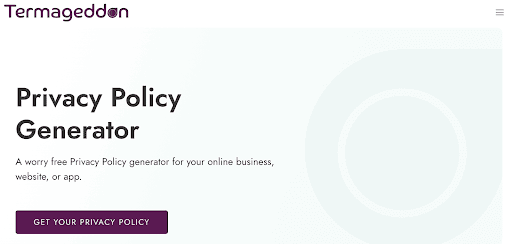
All you have to do is answer a series of simple questions about your business. This way, Termageddon will know which clauses will apply to your education site.
The tool will then generate a custom Privacy Policy for you. You can simply copy its embed code and paste it into your desired location on your WordPress site:
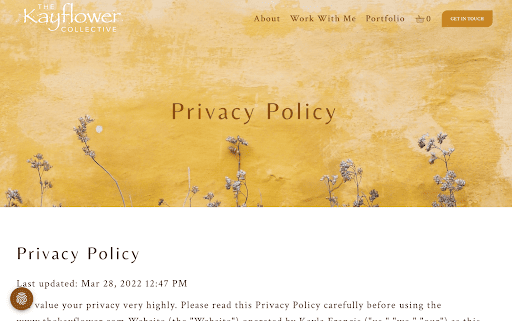
Termageddon’s Privacy Policy Generator is a dynamic tool. When existing privacy laws change, your custom policy will automatically be updated to help with compliance. It will even include a “Last Updated” notice at the top to show users that your policy reflects the latest laws.
Note that Termageddon also offers a Cookie Policy Generator and a Cookie Content Solution. These tools can help you collect data in an ethical way.
2. Create a WordPress Page for Your Policy
Since a Privacy Policy is a comprehensive document, it can be pretty long. Therefore, it’s best to give it the dedicated space it needs.
We recommend creating an entire WordPress page for your Privacy Policy. If you tack it onto an existing page, it might look a little messy and unprofessional. Furthermore, it may make your policy non-compliant, as several privacy laws state that it must be a standalone document.
After you paste your Privacy Policy onto the page, you can customize it as you wish. You’ll also want to make sure the design is cohesive with your visual brand and matches the style of other pages on your site. For instance, you’ll want to use the same fonts and colors.
3. Properly Structure Your Privacy Policy
Since the Privacy Policy for an education website can be pretty long, you’ll want to structure it in a way that makes it easy to read and follow. For example, you might want to separate different sections of your policy into expandable sub-sections:
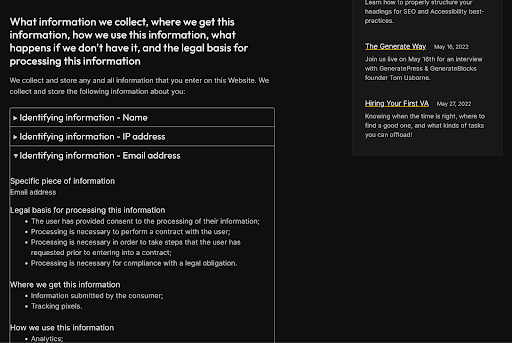
This way, users can find the information they’re looking for without having to scroll through the entire content. Plus, it can make your page look cleaner and more professional.
4. Link to Your Privacy Policy in the Footer
Using a generator to write your Privacy Policy can drastically simplify the process. However, once that’s done, you’ll want to make sure that users can find it.
It’s a good idea to link to your Privacy Policy in your footer, as this is common practice:
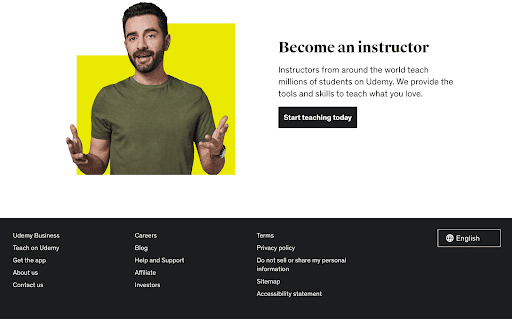
Alternatively, if you don’t have a footer, you could include it as a part of your navigation menu. This way, it’s readily available to users.
5. Make Your Privacy Policy Accessible
Accessibility should be a priority for every business, including education websites. Making your content accessible can help you reach a wider audience while promoting inclusivity. With this in mind, you’ll want to make sure that your Privacy Policy is easy to read.
While it will likely need to contain some formal legalese, you can make it more accessible by using an appropriate font and color. This will make it easier for users with visual impairments to read the policy. Additionally, you may want to consider using a text-to-speech tool.
Conclusion
If you’re launching a WordPress education site, you’ll need to make sure you’re complying with the latest privacy laws. Otherwise, you could end up facing heavy fines and putting your business at risk. Having a thorough and up-to-date Privacy Policy on your site can be a great first step.
To recap, here are a few tips for creating a Privacy Policy for education sites:
- Use a Privacy Policy Generator.
- Create a WordPress page for your policy.
- Properly structure your Privacy Policy.
- Link to your Privacy Policy in the footer.
- Make your Privacy Policy accessible.
Do you have any questions about creating a Privacy Policy for your WordPress education site? Let us know in the comments section below!
